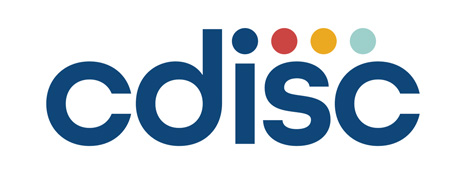C-Path and CDISC Announce Public Review Period for Duchenne Therapeutic Area Standard
June 13, 2017
 |
 |
TUCSON, Ariz., and AUSTIN, Texas – June 13, 2017 – The Clinical Data Interchange Standards Consortium (CDISC) and Critical Path Institute (C-Path) announce the availability of a Duchenne muscular dystrophy therapeutic area user guide (TAUG-DMD v1.0) for public review. The review period for the TAUG-DMD v1.0 began on May 8, 2017, and runs through July 6, 2017. Qualified researchers and clinicians are encouraged to review TAUG-DMD v1.0 and offer feedback.
To review the user guide, please visit: https://www.cdisc.org/public-review/duchenne-muscular-dystrophy-v10-public-review.
TAUG-DMD v1.0 describes the most common clinical concepts relevant to Duchenne studies using the CDISC standard format. This format allows datasets from different sources to be compared or combined for analysis. The US Food and Drug Administration (FDA) Binding Guidance requires that sponsors whose studies start after December 17, 2016, must submit data in FDA-supported CDISC formats listed in the FDA Data Standards Catalog.
Duchenne is a rare, fatal, genetic neuromuscular disorder that is diagnosed in childhood and primarily affects boys. It causes progressive loss of muscle, resulting in loss of the ability to walk, loss of upper body strength, progressive breathing issues, cardiomyopathy, and premature death. There are treatments for Duchenne that slow down disease progression to some extent, but there is currently no cure. Further research is needed to develop better therapies to respond to this urgent unmet medical need.
C-Path launched the Duchenne Regulatory Sciences Consortium (D-RSC) in partnership with Parent Project Muscular Dystrophy (PPMD) to establish drug development tools that can accelerate clinical progress of new therapies for the disease.
“The Duchenne therapeutic area user guide allows users to structure data from existing studies so that they can be compared and aggregated in a scientifically meaningful way,” said Jane Larkindale, DPhil, Executive Director of D-RSC. “Our consortium will use TAUG-DMD v1.0 to develop an aggregated database to extract new knowledge from existing studies, which will inform development of future clinical trials, allowing more efficient testing of future therapies.”
This first version (v1.0) of TAUG-DMD focuses on the representation of data using the CDISC Study Data Tabulation Model (SDTM). Types of data covered include genetic information and imaging data, as well as results from a variety of disease measures including cardiac, musculoskeletal, and pulmonary function assessments. Data standards are also being developed for a variety of functional tests.
TAUG-DMD v1.0 was developed under the Coalition for Accelerating Standards and Therapies (CFAST), with clinical advice and input from D-RSC members. CFAST, a joint initiative of CDISC and C-Path, was formed to accelerate clinical research and medical product development by creating and maintaining data standards, tools, and methods for conducting research in therapeutic areas important to public health, with invaluable support and advice from such organizations as the National Cancer Institute, Innovative Medicines Initiative, TransCelerate, and regulatory agencies including the FDA, Japan’s Pharmaceutical and Medical Devices Agency, and the European Medicines Agency.
CDISC standards have been adopted and used in more than 90 countries, and are required by regulatory authorities in the US and Japan. To date, therapeutic area standards have been developed for more than 25 different disease areas, with most being developed under the CFAST program. Use of these standards from the start of clinical research programs has proven capable of saving both time and resources. Researchers in Duchenne are encouraged to implement these standards into their processes.
About the organizations:

Critical Path Institute (C-Path) is an independent, nonprofit organization established in 2005 with public and private philanthropic support from the Arizona community, Science Foundation Arizona, and the US Food and Drug Administration (FDA). C-Path’s mission is to catalyze the development of new approaches that advance medical innovation and regulatory science, accelerating the path to a healthier world. An international leader in forming collaborations, C-Path has established 14 global, public-private partnerships that currently include over 1,450 scientists from government and regulatory agencies, academia, patient advocacy organizations, and dozens of major pharmaceutical companies. C-Path is headquartered in Tucson, Arizona. For more information, visit www.c-path.org.

About CDISC – CDISC is a 501(c)(3) global nonprofit organization that develops data standards to foster smarter research and enable connections to healthcare. CDISC standards allow data to speak the same language, by providing common formats for data collection, data sharing and data analyses to make the most of the valuable information offered by patients participating in research studies around the globe, enabling researchers to discover new treatments, find breakthroughs, and unlock cures. CDISC standards are required for regulatory submissions to the US FDA and Japan PMDA, are endorsed by the China CFDA, and are requested for use by the European Innovative Medicines Initiative (IMI). The suite of CDISC standards is freely available on the CDISC website.
CDISC is funded through the generous support of over 400 member organizations from pharmaceutical, biotech, clinical research organizations, regulatory agencies, academia, and healthcare, as well as through grants, authorized CDISC Education courses, events, and charitable contributions. To find out more about how to support CDISC and get involved, please visit www.cdisc.org and www.unlockcures.org.
C-Path Contact:
Kissy Black
+1.615.298.1144
kissyblack@lotosnile.com






